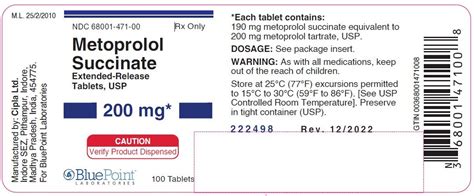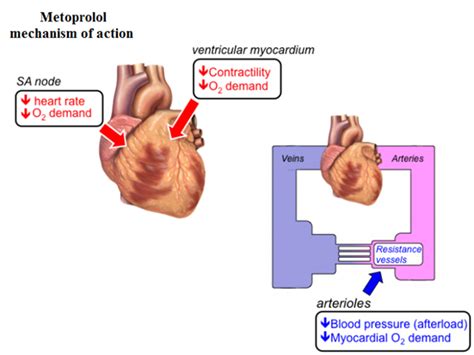Intro
Learn 5 essential tips for taking Metoprolol ER, a beta blocker for heart health, including dosage, side effects, and interactions, to maximize its benefits and minimize risks, ensuring safe and effective blood pressure management.
Metoprolol ER, also known as metoprolol succinate, is a medication used to treat high blood pressure, chest pain (angina), and certain heart-related conditions. It belongs to a class of drugs known as beta blockers, which work by reducing the heart rate and the force of the heart's contractions, thereby lowering blood pressure and increasing blood flow to the heart. Managing conditions like hypertension and angina requires not just medication but also lifestyle adjustments and a thorough understanding of how medications like metoprolol ER work. Here are five tips for individuals taking metoprolol ER, focusing on its benefits, working mechanisms, and practical advice for maximizing its effectiveness.
Firstly, understanding the importance of adherence to the prescribed dosage is crucial. Metoprolol ER is designed for extended release, meaning it releases the medication slowly over time to provide a steady dose of the medication in the bloodstream. This formulation helps in maintaining consistent blood levels of the drug, which is essential for controlling blood pressure and managing angina symptoms effectively. Patients should take their medication at the same time every day, preferably with food or as directed by their healthcare provider, to minimize gastrointestinal side effects.
Secondly, recognizing the potential side effects and knowing how to manage them can significantly improve the quality of life for individuals on metoprolol ER. Common side effects include dizziness, lightheadedness, fatigue, and shortness of breath. While these side effects can be uncomfortable, they often diminish over time as the body adjusts to the medication. Staying hydrated, avoiding sudden changes in position, and ensuring adequate rest can help mitigate some of these effects. It's also important for patients to discuss any concerns or severe side effects with their healthcare provider, as adjustments in dosage or additional medications may be necessary.

Benefits of Metoprolol ER
Metoprolol ER offers several benefits for patients with hypertension and angina. By reducing the heart rate and the force of contraction, it decreases the oxygen demand of the heart, which can help prevent chest pain and reduce the risk of heart attacks. Moreover, its extended-release formulation provides a convenient once-daily dosing regimen, which can improve adherence to medication. For individuals with hypertension, metoprolol ER can help lower blood pressure, reducing the risk of complications such as stroke, heart failure, and kidney disease.
Working Mechanism
Understanding the working mechanism of metoprolol ER is essential for appreciating its role in managing cardiovascular conditions. As a beta-1 selective blocker, metoprolol ER primarily affects the heart, reducing heart rate, contractility, and cardiac output. This selective action minimizes effects on airway smooth muscles and peripheral arteries, making it a preferable choice for patients with respiratory conditions like asthma. The drug's extended-release mechanism ensures a steady and consistent effect throughout the day, providing prolonged control over blood pressure and angina symptoms.
Practical Advice for Patients
For patients on metoprolol ER, several practical tips can enhance the medication's effectiveness and minimize side effects. Firstly, maintaining a healthy lifestyle, including a balanced diet, regular exercise, and avoiding smoking, is crucial. Exercise should be approached cautiously, as metoprolol ER can affect heart rate response to physical activity; patients should consult with their healthcare provider to develop a safe exercise plan. Additionally, keeping track of blood pressure at home and reporting any significant changes or concerns to the healthcare provider can help in adjusting the treatment plan as needed.
Steps for Maximizing Effectiveness
Maximizing the effectiveness of metoprolol ER involves several steps: - **Regular Monitoring**: Regular check-ups with the healthcare provider are essential to monitor the drug's effectiveness and adjust the dosage as necessary. - **Lifestyle Modifications**: Implementing lifestyle changes such as reducing sodium intake, increasing physical activity (under guidance), and managing stress can complement the medication's effects. - **Medication Adherence**: Adhering strictly to the prescribed dosage regimen is vital for maintaining consistent drug levels in the body. - **Open Communication**: Patients should maintain open communication with their healthcare provider, reporting any side effects, changes in symptoms, or concerns about the medication.
Conclusion and Future Directions
In conclusion, metoprolol ER is a valuable medication for the management of hypertension and angina, offering a convenient once-daily dosing regimen and a favorable side effect profile. By understanding its benefits, working mechanism, and adhering to practical advice, patients can maximize the effectiveness of metoprolol ER and improve their overall cardiovascular health. Future directions in the management of these conditions may involve personalized medicine approaches, where treatments are tailored to the individual's genetic profile and medical history, potentially leading to more effective and targeted therapies.
We invite readers to share their experiences or ask questions about managing hypertension and angina with metoprolol ER. Your insights can help others understand the importance of adherence, lifestyle modifications, and open communication with healthcare providers in achieving better health outcomes. Please feel free to comment below or share this article with someone who might benefit from this information.
What is metoprolol ER used for?
+Metoprolol ER is used to treat high blood pressure, chest pain (angina), and certain heart-related conditions.
How does metoprolol ER work?
+Metoprolol ER works by reducing the heart rate and the force of the heart's contractions, thereby lowering blood pressure and increasing blood flow to the heart.
What are the common side effects of metoprolol ER?
+Common side effects include dizziness, lightheadedness, fatigue, and shortness of breath. These side effects often diminish over time as the body adjusts to the medication.
